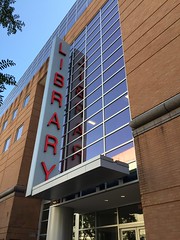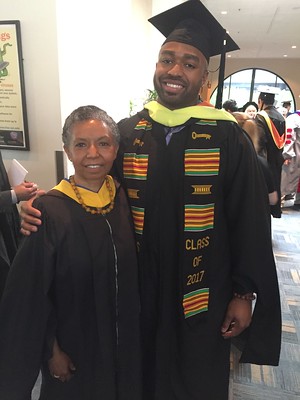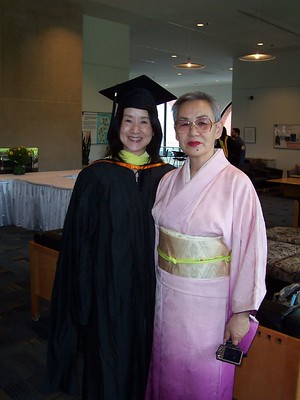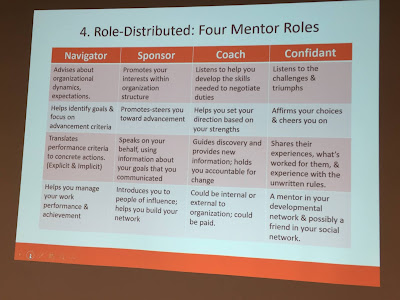 Disclaimer: What follows is my point of view. Mine and no one else's.
Disclaimer: What follows is my point of view. Mine and no one else's.
At the end of part 2, I wondered if there are other options which might help to diversify library staff. Yes, and it is a radical idea. (BTW here is a link to part 1.)
Focus on the Community
Mr. Spock: “Logic clearly dictates that the needs of the many outweigh the needs of the few.”
Captain Kirk: “Or the one.”
I know there are problems with that quote from Star Trek II, but I still like it. In this case, what if we focused on the needs of our communities in terms of having diverse representation among the professional library staff? What if we decided to break down barriers to make that happen? What if doing that outweighed - or altered - what we do now?
In other words, how does library education need to change in order to have the diversity we desire in our libraries? I'm talking real change and not just tweaks.
What does it mean to be an educated librarian?
Somewhere at least once a year there is a conversation about why the MSLIS degree matters. What is taught? What is learned? What should be taught? Is it a rubber stamp (is it truly necessary)? Is there some way of passing a test instead of going to graduate school? How come the undergraduate degree doesn't mean much?
In other words, what does it mean to be an educated librarian? Imagine if we knew the answer to that. Imagine if we - the profession, our academic programs, and associations - could agree on what that meant. We could then focus not on six years of higher education to become a librarian, but on acquiring specific knowledge and skills. We might create a path for more people from diverse backgrounds to enter the profession.
By the way, some of these conversations in the past turn into shouting matches, because everyone is passionate about this and people want it their way. Likely these conversations need skilled mediators, who can move the group beyond shouting, and beyond their own opinions and self interesting, and towards thinking about what is best for our diverse communities, if we want our staff to represent the people they serve.
An agreement on knowledge, skills, and abilities
The American Library Association - and other library associations - have lists of core competencies. The ALA document states:
This document defines the basic knowledge to be possessed by all persons graduating from an ALA-accredited master’s program in library and information studies.
The
ALA Standards for Accreditation of Master’s Programs in Library and Information Studies (2019) states under Curriculum:
II.2. The curriculum is concerned with information resources and the services and technologies to facilitate their management and use. Within this overarching concept, the curriculum of library and information studies encompasses information and knowledge creation, communication, identification, selection, acquisition, organization and description, storage and retrieval, preservation and curation, analysis, interpretation, evaluation, synthesis, dissemination, use and users, and management of human and information resources.
None of this gets at the core skills a librarian needs for specific positions or specific situations. That is left up to the hiring managers, who seek candidates with the knowledge, skills, and abilities (KSAs) they believe are most relevant. Imagine being a student and trying to obtain the correct KSAs for the job you want to hold. You are going to receive different advice from various peoples on classes to take and skills to acquire (either in class or on the job). What if there was some agreement on the KSAs needed?
First, there would need to be agreement on what the jobs are in libraries and see similarities across those positions. Those jobs might be categorized and then specific KSAs determined for those categories. This step would benefit those interested in working in libraries, because they would be able to see a group of jobs that required similar KSAs. They would know better what KSAs to acquire, which positions to seek, and what their career path might be. They would also know what KSAs to acquire in order to make a career move.
Yes, this step would also help hiring managers, because it would help them define what skills (KSAs) a person needs for a specific jobs.
Second, there would need to be agreement on how these KSAs are acquired. Yes, it could be that some college courses would be required. And it could be that for some management positions - or very specialized positions - that a graduate degree would be necessary. However, if we want to make our profession accessible to more people, we need to eliminate the hurdles that higher education creates. What about:
- Work in other industries where a person might demonstrate customer service skills, storytelling, working with special population
- Specific workshops, webinars, or continuing education courses
- Internships
- Library work experience
- Proof of specific skills through tests
- This could be wonderful for skills we want staff to have, but that aren't in college courses like proficiency with office-related software.
Oh...I can hear you screaming at me how this wouldn't work. This wouldn't work in our current system, but what if we re-imagined our profession?
BTW although you may be reading these posts as focused on public libraries, I do believe this change would work across all library types.
Impact on accreditation and MSLIS programs
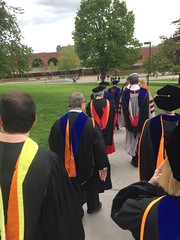 A change like this could not occur overnight because there would need to be widespread agreement about it, and specific groups would need to be willing to radically change how they think and what they do.
A change like this could not occur overnight because there would need to be widespread agreement about it, and specific groups would need to be willing to radically change how they think and what they do.
I have worked in a professional academic school and led a program successfully through an ALA Accreditation review. I understand the impact that the Council for Higher Education Accreditation has on programmatic accrediting organizations like ALA, as well as regional accreditors like MSCHE. None of them will look at the idea I've laid out here with glee, because it changes the paradigm they live in. It could make them less relevant, which they would not like.
MSLIS programs will not be happy with this idea, because it would decrease their enrollments. Some might successfully pivot to focus on those areas which would still need an advanced degree. Others might focus on providing those college classes that library workers would need to qualify for their positions. Some might focus more on professional development. Some might turn their efforts away from libraries and more into information science (a trend that some believe is already occurring(. A few might become the places that educate future library educators. (Yes, library educators would still be needed.) And, yes, some might close.
Would the MSLIS totally disappear? I don't think so, but I do think it would be very different.
Remember to focus on diversifying the profession
We're struggling to diversify the profession and so we need to think differently. We need to locate people from diverse backgrounds who have some interest in librarianship. We need to cultivate that interest in them and move them towards thinking about librarianship as a career. We know that there is a narrowing funnel between graduating high school and getting a master's degree, and that fewer people from diverse backgrounds make it through that funnel. So can we remove the funnel?
BTW our overall population trend in the U.S. is downward, which is why allowing people to immigrate to the U.S. is important. Fewer 18 year olds translates into fewer college graduates, etc.
We know that a stumbling block is the cost of a bachelor's degree, plus the cost of a master's, given the low salaries for many library positions. People are going into debt to become a librarian. Could this remove that stumbling block and make being a librarian a more economically feasible job choice?
No, I haven't lost my mind
Finally, no, I haven't lost my mind. I start this thought process because of notes in old work journals, where I saw the same issues and ideas rising again and again in different conversations. I think that the only way of moving forward is radical change.
Yes, I have just laid out in this blog post ideas that you might really not like. That's okay. Perhaps the radical change that is needed to diversify librarianship is something else and not this. Whatever it is, we need to be working on it because it will take time to implement and have a real impact. And we need to start now.


